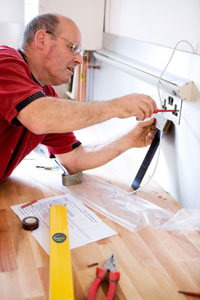Home Improvement Safety: Should You Do-it-Yourself?
By Amy White
Photo: © Chris Schmidt - iStockphoto
 Your home is starting to show its age. The shingles are curling, the kitchen floor is sagging, and the basement walls are leaking. So you grab your tool belt and hammer and set out to fix the problems, do-it-yourself style. You'll save thousands of dollars on the cost of hiring a contractor. Best of all, you'll feel the pride and the satisfaction that come from doing a job yourself. Until you fall off the roof, that is. Or you electrocute yourself. Or the living room ceiling buries you alive. While any homeowner can handle basic home repairs, some jobs should be left to the professionals.
Your home is starting to show its age. The shingles are curling, the kitchen floor is sagging, and the basement walls are leaking. So you grab your tool belt and hammer and set out to fix the problems, do-it-yourself style. You'll save thousands of dollars on the cost of hiring a contractor. Best of all, you'll feel the pride and the satisfaction that come from doing a job yourself. Until you fall off the roof, that is. Or you electrocute yourself. Or the living room ceiling buries you alive. While any homeowner can handle basic home repairs, some jobs should be left to the professionals.
Electrical
Electricity is like a bomb - cut the wrong wires, and you could end your life. For an inexperienced homeowner working with live wires, an electric shock is only one mistake away. According to the Mayo Clinic, electric shocks can result in cardiac arrest, respiratory failure, seizures, and unconsciousness. And if you connect those wires incorrectly, you could be putting your home and your family in danger. According to the National Fire Protection Association, electrical failure or malfunction caused 52,500 fires in U.S. homes in 2006; over 300 people died as a result of those fires. The National Electrical Code outlines the proper ways to wire a home for electricity. A certified contractor follows those guidelines, ensuring that your home won't burst into flames when you plug in the toaster. So unless you can quote paragraphs from the National Electrical Code, do not attempt to rewire your home.
Severe Mold
Mold isn't just unpleasant to look at - this fungus can negatively impact your health. Side effects vary from respiratory infections to allergy symptoms to eye and throat irritation. If your home smells damp and musty, chances are you have mold. The good news is you can clean surface mold yourself with a simple bleach solution. But sometimes mold lives behind walls and under floors, feeding on the dead organic material in drywall and wooden studs. Hidden mold can spread quickly. If the mold has spread to an area greater than ten feet, you'll need to call in the professionals. Try to tackle the project yourself, and you could be putting your health - and your ability to breathe - at risk. Find a contractor who has experience cleaning mold-infected homes. Ask your contractor to follow the Environmental Protection Agency's mold cleanup recommendations listed in the Mold Remediation in Schools and Commercial Buildings. |
Structural
You might want an open-concept first floor, but don't start swinging that hammer just yet. That wall separating your living room from your kitchen might be holding up your entire house. A house is like a tower of children's wooden blocks; without an adequate foundation, the whole tower comes crashing down. A load-bearing wall supports the upstairs levels of your home. A lintel keeps beams and floors from toppling into doorways and windows. And the basement walls support your home's exterior walls and roof. Before you take a sledgehammer to your living room, consult with a contractor or architect to see if that wall with the bullseye is load bearing. If not, hammer away. But if it is structural, hire a contractor for the job; removing a load-bearing wall requires the installation of a large beam, a task best left to the professionals.
Roofing
Replacing a few broken shingles on a roof is not a dangerous task - until you factor in the twenty-foot drop. Keeping your balance is difficult when you're swinging a hammer on a steeply-pitched roof. Roofing contractors work with safety harnesses that protect them from long falls and crushed bones. So unless you have airbags on your front lawn to cushion your fall, leave the re-shingling job to your contractor.
You might not be able to tackle the above jobs, but you don't have to hand your tool belt over to the professionals. The average homeowner can carry out hundreds of home improvements. Tiling floors, painting walls, and installing hardwood are low-risk improvements that yield dramatic results. But safety should always come first. To prevent injuries, make sure you wear the proper protection for the job. If you are climbing ladders, wear shoes with anti-slip soles to prevent falls. Kneepads come in handy when tiling a bathroom floor. If you're lifting heavy objects or working with nail guns, wear safety boots with a steel toe to keep your toes intact. And most jobs require protective eyewear and gloves. By wearing the proper safety gear - and by calling in the professionals for the difficult home improvement jobs - you can ensure that you live to DIY another day. |

 Your home is starting to show its age. The shingles are curling, the kitchen floor is sagging, and the basement walls are leaking. So you grab your tool belt and hammer and set out to fix the problems, do-it-yourself style. You'll save thousands of dollars on the cost of hiring a contractor. Best of all, you'll feel the pride and the satisfaction that come from doing a job yourself. Until you fall off the roof, that is. Or you electrocute yourself. Or the living room ceiling buries you alive. While any homeowner can handle basic home repairs, some jobs should be left to the professionals.
Your home is starting to show its age. The shingles are curling, the kitchen floor is sagging, and the basement walls are leaking. So you grab your tool belt and hammer and set out to fix the problems, do-it-yourself style. You'll save thousands of dollars on the cost of hiring a contractor. Best of all, you'll feel the pride and the satisfaction that come from doing a job yourself. Until you fall off the roof, that is. Or you electrocute yourself. Or the living room ceiling buries you alive. While any homeowner can handle basic home repairs, some jobs should be left to the professionals.



